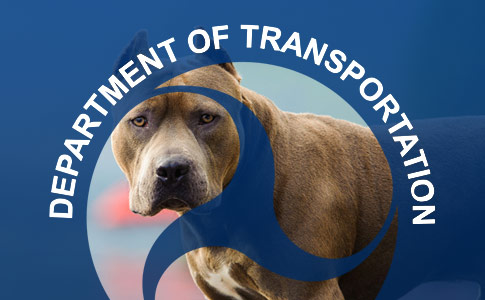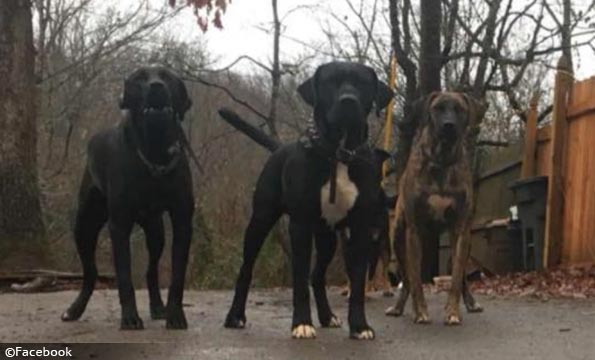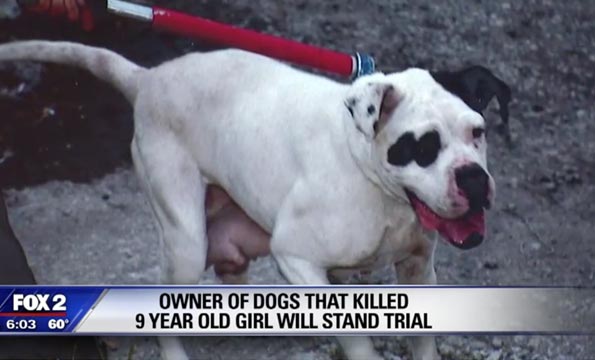What Does it Mean for Delta's Pit Bull Ban? - Discussion

On August 8, the DOT issued their final enforcement priorities regarding service animals. The DOT's guidance comes after airlines began tightening policies on service and support animals.
News headlines followed with claims like, "Delta can't ban pit bulls." Due to how the current rule is written, however, Delta may have legal basis; they would not have issued the ban otherwise.
Our special report dives into the areas of the current rule that are undefined. We also address the "gaping loophole" in the ACAA that has allowed fake ESA certification websites to flourish online.
Enforcement Priorities
On August 8, the Department of Transportation (DOT) issued a final statement of enforcement priorities regarding service animals. Later this year, the DOT is expected to issue a Notice of Proposed Rulemaking (NPRM) which will address the "appropriate definition of a service animal" and "include safeguards to ensure safety and reduce the likelihood that passengers wishing to travel with their pets on aircraft will be able to falsely claim that their pets are service animals."
The enforcement priorities come after Delta and other airlines adopted new policies after the period of the Advance Notice of Proposed Rulemaking (ANPRM) seeking comment on amending the Air Carrier Access Act (ACAA) regulation of service animals ended on July 9, 2018. Delta had announced in June that starting on July 10, 2018 it would limit each passenger to one emotional support animal per flight and would prohibit pit bull-type dogs as service and support animals.
The DOT's enforcement priorities primarily address the new policies adopted by airlines since early 2018. These policies attempt to tackle the growing number of fake service and emotional support animals (ESAs), but primarily the growth of untrained ESAs flying in the cabin. The sole function of an ESA is to "provide comfort" for a person with disabilities. ESAs are not trained to perform a specific task and have no protection under the American Disabilities Act (ADA).
In June 2017, a Delta passenger was repeatedly attacked in the face by an untrained psychiatric service dog. In May 2019, the victim sued Delta and the dog's owner, intensifying this issue.
The DOT's enforcement priorities address airline policies containing breed restrictions, species restrictions, weight restrictions, age and number of service animal restrictions, flight-length restrictions, letter and form requirements for ESA and psychiatric services animals (PSA), form requirements for service animals (non ESA and PSA), as well as requirements for passengers with ESAs or PSAs to check into the ticket area (also called the "lobby") prior to their flight.
Airlines have until mid-September to adjust any policies that are out-of-step with the Enforcement Office's interpretation of the current rule, of which parts remain undefined and may continue to be undefined when the DOT issues its NPRM regarding the "appropriate definition of a service animal" later this year. The DOT guidance is "not legally binding in its own right" and conformity with the guidance (as distinct from existing statutes and regulations in Part 382) is voluntary only.
The Current Rule
The current rule (within the Foreign Carriers NPRM) was enacted in 2008, and is also called Part 382. It amended the Air Carrier Access Act in areas, including the transportation of service animals. However, of the total 1290 comments received for the Foreign Carriers NPRM, over 1100 (85%) regarded service animals. The DOT's final statement of enforcement priorities reflects the existing statutes and regulations in Part 382, as well as provides interpretations of them.
The goal of the DOT's final statement of enforcement priorities is to inform the public and airlines about policies that are in violation or are "inconsistent" with Part 382, and thus may be subject to potential enforcement. However, as the DOT admits in the guidance, there are still undefined areas in Part 382. Specifically, how airlines may (or may not) assess whether or not a service animal (including ESAs and PSAs) poses a "direct threat to the health or safety of others."1
Delta's Pit Bull Ban
On page 25, the DOT summarizes their enforcement priorities. The first item is Species and Breed Restrictions. As gathered from parts of the DOT's guidance statement, "the Department is not aware of and has not been presented with evidence supporting the assertion that an animal poses a direct threat simply because of its breed" and "The Enforcement Office continues to take the view that restrictions on specific dog breeds are inconsistent with the current regulation."
Delta's view is that "untrained, pit bull-type dogs posing as both service and support animals are a potential safety risk." Delta also stated at that time, "We must err on the side of safety." That was their legal understanding of the ACAA in June of 2018. Not coincidentally, Section 382.117(f) of the current rule does not define how airlines can assess if a service or support animal presents a "direct threat to the health or safety of others" -- possibly an invitation to Delta's interpretation.
On September 23, 2019 Delta announced it is continuing its pit bull ban, stating: "Pit bulls account for less than 5 percent of the overall dog population but 37.5 percent of vicious dog attacks."
§ 382.117(f) "You are never required to accommodate certain unusual service animals (e.g., snakes, other reptiles, ferrets, rodents, and spiders) as service animals in the cabin. With respect to all other animals, including unusual or exotic animals that are presented as service animals (e.g., miniature horses, pigs, monkeys), as a carrier you must determine whether any factors preclude their traveling in the cabin as service animals (e.g., whether the animal is too large or heavy to be accommodated in the cabin, whether the animal would pose a direct threat to the health or safety of others, whether it would cause a significant disruption of cabin service, whether it would be prohibited from entering a foreign country that is the flight's destination).2 If no such factors preclude the animal from traveling in the cabin..." - 14 CFR § 382.117(f)
While many newspaper headlines stating, "Delta can't ban pit bulls" and the "DOT rejects Delta's pit bull ban" appeared after the DOT's enforcement priorities was published, the issue is not necessarily so black and white. The DOT simply stated, "The Enforcement Office intends to use available resources to ensure that dogs, cats, and miniature horses are accepted for transport," meaning all dog breeds. Below are areas in the DOT guidance that discuss a "direct threat."
"In the Interim Statement, we explained that airlines may refuse transportation to any service animal that poses a direct threat to the health or safety of others. We observed, however, that our service animal regulation does not explain how airlines may (or may not) make that assessment" ...
"As we explained in the documentation section above, Part 382 permits airlines to determine, in advance of flight, whether any service animal poses a direct threat, but the rule does not clearly indicate how airlines must make that assessment" ...
"In general, it is not clear whether airlines are violating Part 382 if they require additional documentation to determine whether a service animal poses a direct threat. Part 382 permits airlines to determine, in advance of flight, whether any service animal poses a direct threat. However, that section is not clear about how airlines would determine whether an animal poses a direct threat to the health or safety of others" - Guidance on Nondiscrimination on the Basis of Disability in Air Travel, U.S. Department of Transportation, August 8, 2019
On May 23, 2018 Delta authored their comments for the Advance Notice of Proposed Rulemaking (ANPRM). Delta stated within them: "Absent an approach that clearly demonstrates an animal can behave properly, airlines should be able to impose breed restrictions to ensure passenger safety."3 On June 20, Delta announced that starting on July 10, it would limit each passenger to one support animal per flight and prohibited pit bull-type dogs as service and support animals.
"To address operational issues, airlines should be permitted to require documentation of (a) the passenger's qualifying disability by a licensed medical professional, (b) behavioral training of the service animal, and (c) veterinary health records. Airlines should be permitted to require this documentation 48 hours in advance of a flight to provide opportunity to effectively evaluate the documentation. This approach is similar to the "Pet Passport" adopted by European Union countries. Absent an approach that clearly demonstrates an animal can behave properly, airlines should be able to impose breed restrictions to ensure passenger safety." - Delta Air Lines, May 23, 2018
In July, (prior to the DOT's new guidance), Delta defended their ban and threw some chilly water on a potential ruse.4 Delta denied a woman who tried to reserve a Delta flight to fly a pit bull-mix service dog to its client (the disabled client was not flying with the dog). When the woman protested and said, "that's discrimination, that's illegal," Delta allegedly replied, "No, we have lawyers on standby. We wouldn't do this if there were any legal issues that could arise."
The fact is, we don't know how Delta will respond policy-wise to the DOT's final enforcement priorities. It is also unknown if the "direct threat" issue will be addressed by the DOT later this year. We just know that policy adjustments are due in September. We also know that Part 382 does not explain how airlines may (or may not) make a direct threat assessment and that Delta believed when banning pit bull-type dogs as service and support animals, it was legally sound.
Learn why breed matters in service dogs and why pit bull service dogs are a bad idea. Primarily, pit bull "breed advocates," not advocates for the disabled, promote pit bulls as service dogs.
Military Breed Bans
A decade ago, the U.S. Army, U.S. Marine Corps and U.S. Air Force banned pit bulls and several other dog breeds from privatized housing. The Marine Corps order states, in part: "Pit bulls, rottweilers, canid/wolf hybrids, or any canine breed with dominant traits of aggression present an unreasonable risk to the health and safety of personnel in family housing." The DOT is misleading by stating there is no evidence that a dog "poses a direct threat simply because of its breed."
For federal precedent, the DOT needs to look no further than the United States Armed Forces for this evidence. Furthermore, at Camp Lejeune -- one of the largest U.S. Marine Corps bases in the country -- service dogs must be evaluated annually by the Department of Animal Control Office (DACO) and must pass an evaluation test in order "to be recognized as a service dog aboard the installation." Delta is not in the animal control or animal behavior business -- no airline is.
Developing Standards
Currently, the DOT is allowing airlines some tools to assess behavior in ESAs and PSAs, including a signed Veterinary Health Form (proof of rabies and distemper vaccinations), a signed Confirmation of Animal Training form and a signed letter from a licensed mental health professional stating the passenger has a mental health-related disability. But Delta wants more than this. Delta wants the DOT to "develop clear and consistent standards" that a dog is trained.
"Reduce abuse and fraud by clarifying and simplifying regulations to the greatest extent possible. The multiple categories with different standards and guidance do not serve passengers with disabilities or airlines well. The DOT should establish one category of service animals to accommodate any trained service animal providing assistance to a person with a qualifying disability. DOT must develop clear and consistent standards and processes for determining that a dog is trained and establishing that a person has a need for the service animal to prevent fraud and abuse. Reform should also limit the definition of service animals to dogs." - Delta Air Lines, May 23, 2018
Loophole in Current Rule
The ADA defines a disability as "a physical or mental impairment that substantially limits one or more of the major life activities of such individual; a record of such an impairment; or being regarded as having such an impairment." Section 382.117(e) of the current rule, however, states that passengers with ESAs or PSAs must only have a "mental or emotional disability recognized in the Diagnostic and Statistical Manual of Mental Disorders - Fourth Edition (DSM IV)."
Airlines for America, a trade organization, states in their DOT comments: "Section 382.117(e)(1) refers to passengers that have a 'mental or emotional disability recognized in the [DSM],' but does not refer to 'any disorder (or condition) identified in the DSM.' However, a disorder is not synonymous with a disability; not all disorders manifest in a functional impairment that would be considered a legal disability, and the DSM lists many disorders that are not disabilities."
"This is not merely a technical distinction, on the contrary, it is a gaping loophole that all but invites tens of millions of non-disabled passengers to claim the need for an ESA accommodation," Airlines for America states. "DOT's conflation of medical 'disorders' and 'conditions' identified in the DSM with the legal concept of 'disability' has created confusion and facilitates fraud."5 The DOT's unwitting language is in part why fake ESA certification websites can legally flourish online.
"According to research published by the National Institute of Mental Health, an estimated 18.1% of Americans age 18 and older, suffered from a diagnosable mental disorder in 2014 ... with an average of 26.2% in any given year .... This begs the question as to whether an individual has a mental health-related disability listed in the DSM–5, and whether the animal in question alleviates the person's mental health symptoms in some way if accompanying the person while flying. One can argue that one in four adults could realistically qualify for an ESA. As illogical as it may seem, this would imply the ACAA would allow up to one fifth to one-quarter of passengers to potentially bring their pets on board the plane if needed."6 - Boness C. L., Younggren, J. N. & Frumkin I. B., 2017.
Summary
We do not know how Delta will respond policy-wise to the DOT's final guidance of enforcement priorities regarding their pit bull service and support dog ban. We do know that on June 22, 2018, two days after Delta announced their ban policy, the Enforcement Office issued a public statement indicating its view that "a limitation based exclusively on breed of the service animal is not allowed under the Air Carrier Access Act." Delta implemented their ban policy three weeks later anyway.
If the DOT were to develop "clear and consistent standards" for determining whether a dog is trained that the airlines could follow, along with revising the "gaping loophole" in the current rule that conflates medical "disorders" and "conditions" identified in the DSM with the legal concept of "disability" -- which ushered in an era of a massive number of non-disabled passengers claiming the need for an ESA accommodation -- perhaps Delta would not need the blunt tool of a ban.
Related articles:
06/04/19: Delta Passenger Attacked in the Face by a Large "Support" Dog Sues Airline...
03/04/19: Mother of Child Mauled by an 'Emotional Support' Pit Bull at Portland Airport Sues
07/05/18: Why Breed Matters in Service Dogs and Why Pit Bull Service Dogs are a Bad Idea
06/23/18: Delta Bans Pit Bull-Type Dogs as Service, Support Animals in the Cabin
01/25/18: Delta Tightens Reins on Untrained 'Support' Dogs in the Aircraft Cabin
07/14/17: Delta Passenger is Severely Attacked by an Unrestrained Emotional Support Dog









